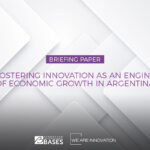Argentina’s economy has begun a remarkable recovery that few thought possible just a year ago. With poverty dropping significantly from 52.9 percent to 38.1 percent in the second half of 2024, according to INDEC data, Argentina appears to have finally embarked on a path of stabilization. This change, driven by the austerity and macroeconomic prudence measures implemented by Javier Milei’s administration, should be leveraged to build an economy based on innovation and growth.
From austerity to growth
Milei’s chainsaw has managed to start controlling inflation, generate fiscal surpluses and restore some confidence in international markets. However, stabilization is only the first step on a long road to prosperity. Argentina now needs a growth strategy based on sectors with high innovative potential that can attract foreign direct investment, generate quality employment and increase exports.
A recent report by the Fundación Internacional Bases and We Are Innovation entitled “Fostering Innovation as an Engine of Economic Growth in Argentina” identifies four key sectors with high potential and relative ease of implementation: agtech, green hydrogen, lithium production, and innovative consumer products.
Four key sectors for economic take-off
Argentina has extraordinary potential in four strategic sectors that could become engines of sustainable growth. As the world’s third largest food exporter, the country has seen its position in international markets eroded, with a share that fell from 2.7 percent to 2.2 percent in a decade, a victim of counterproductive policies that penalize producers with withholding taxes, while the rest of the world subsidizes its farmers. Nevertheless, there is already an ecosystem of 165 companies specialized in agrotechnology that are just waiting for a favorable framework to unleash an innovation boom with multiplier effects.
At the same time, the Argentine territory offers ideal conditions for the production of renewable energies, especially in Patagonia with its exceptional winds and in the north with its solar potential, positioning the country as a natural producer of green hydrogen, a market that will reach 30 billion dollars by 2030. This potential has already been recognized internationally with the European commitment of 200 million euros and Fortescue’s millionaire investment of 8.4 billion, although regulatory implementation needs to be accelerated to capitalize on these opportunities.
The lithium sector is undergoing its own revolution with the implementation of Direct Lithium Extraction (DLE), which reduces water consumption by 50 percent and shortens production cycles from 18 months to just days. Projects such as Rio Tinto’s Rincón are already implementing systems that recycle 80 percent of the water used, while new clay deposits are being discovered in San Juan and geothermal brines in La Rioja that could triple reserves by 2035.
Complementarily, Argentina’s position as the world’s ninth largest tobacco producer could be transformed into a platform for the manufacture of innovative nicotine products, a market projected at US$ 63 billion by 2032, generating quality employment and multiplier effects in related industries, although currently blocked by a prohibitionist regulatory framework.
Start your engines
To capitalize on these strategic opportunities, Argentina needs to implement a comprehensive approach that simplifies the regulatory framework, eliminates trade barriers and generates confidence in international investors. This involves reducing capital controls, establishing tax incentives for key sectors and creating zones with favorable legal frameworks that encourage industrial concentration. Improving infrastructure and strengthening international trade agreements, particularly with the European Union and the United States, would complement these structural reforms, creating an ecosystem conducive to foreign direct investment.
Proactive reforms can redefine the country’s economic trajectory. The four sectors identified – agrotechnology, green hydrogen, lithium and innovative nicotine products – represent immediate opportunities with truly transformative potential. The key lies in finally abandoning the interventionism of past decades and allowing the country’s entrepreneurial talent, abundant natural resources and skilled human capital to flourish in an environment of economic freedom and legal certainty.
* Federico N. Fernández is a visionary leader dedicated to driving innovation and change. As the CEO of We Are Innovation, a global network of 45+ think tanks and NGOs, Federico champions innovative solutions worldwide. His expertise and passion for innovation have earned him recognition from prestigious publications such as The Economist, El País, Folha de São Paulo, and Newsweek. Federico has also delivered inspiring speeches and lectures across three continents, authored numerous scholarly articles, and co-edited several books on economics.
Source: We Are Innovation











